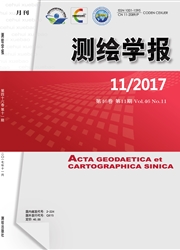

 中文摘要:
中文摘要:
在SAR成像过程中,利用目标相对于雷达运动的多普勒频率进行方位向压缩来提高方位向分辨率。对于海面舰船目标,往往由于SAR发射的脉冲重复频率过低,回波信号的多普勒频率欠采样,引起高亮度的方位向模糊噪声,产生虚假目标。若直接利用传统CFAR、予孔径相干等目标检测算法,会把方位向模糊引起的虚假目标误判为舰船目标,降低了舰船目标的检测精度。针对SAR影像方位向模糊现象,提出一种利用全极化SAR数据的舰船目标检测算法,其利用H-A-AIpha分解得到的第三散射机制。结合方位向全极化子孔径相干,消除了方位向模糊噪声对舰船目标检测的影响,提高了舰船目标的目标杂波比。通过采用日本玉野Kojimawan港口附近的C波段AIRSAR全极化数据进行试验,验证了该算法能消除SAR方位向模糊,降低虚警率,提高舰船目标的检测精度。
 英文摘要:
英文摘要:
During the SAR imaging process, the Doppler frequency caused by ship targets moving relative to SAR sensor is usually utilized in azimuth compression, which improves the azimuth resolution. For ship targets, strong intensity azimuth ambiguities are always induced, due to the discrete sampling of the Doppler frequency signal caused by lower PRF emitted by SAR. Because oi the azimuth ambiguities having higher gray value, they always were mistaken as the real ships by directly applying the classical targets detection algorithms, such as CFAR, suaperture cross-correlation, etc. Thus they reduced accuracy of ships detection. Therefore, a new ships detection algorithm based on polarimetric data was propesed in this paper, which makes use of the third scattering mechanism obtained from the results of the H-A-Alpha polarimetric decomposition, and utilizes the sub-aperture cross-correlation theorem to eliminate the effects of azimuth ambiguities on ships detection, and improves the TCR of ship targets. Moreover, it is indicated that the algorithm can eliminate the azimuth ambiguities efficiently,and reduce false alarm rate to improve the accuracy of ship targets detection by using C band JPL AIRSAR polarimetric data from the Koiimawan in Tamano, Japan.
 同期刊论文项目
同期刊论文项目
 同项目期刊论文
同项目期刊论文
 期刊信息
期刊信息
